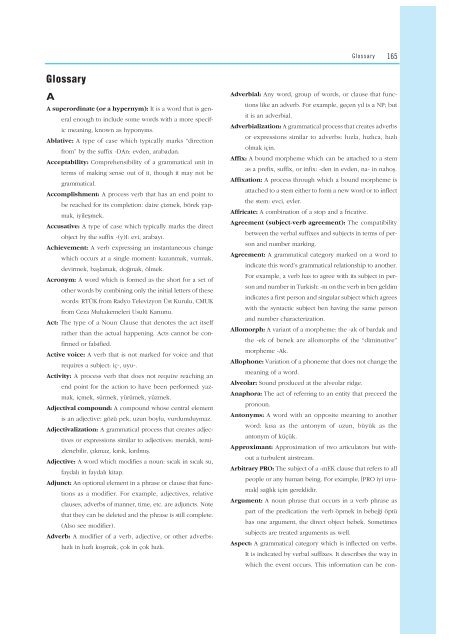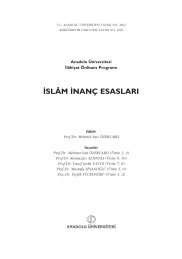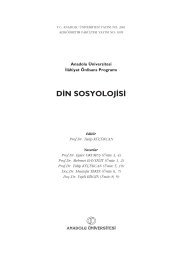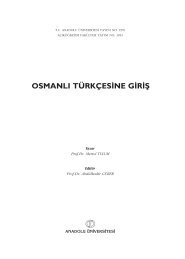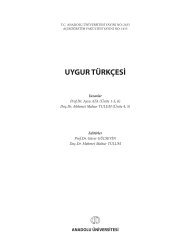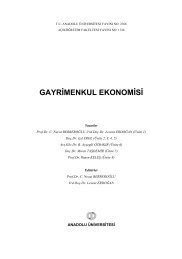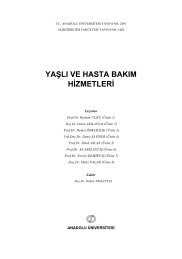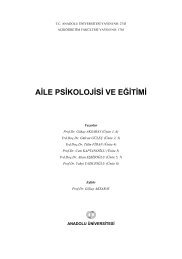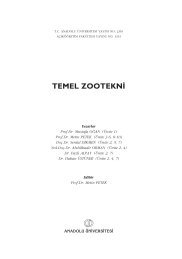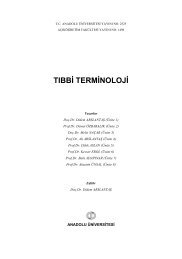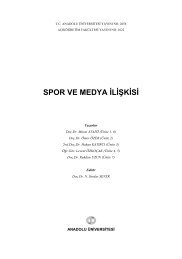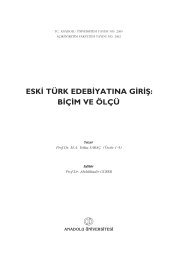turkish phonology and morphology (türkçe ses ve b‹ç‹mb‹lg‹s‹)
turkish phonology and morphology (türkçe ses ve b‹ç‹mb‹lg‹s‹)
turkish phonology and morphology (türkçe ses ve b‹ç‹mb‹lg‹s‹)
You also want an ePaper? Increase the reach of your titles
YUMPU automatically turns print PDFs into web optimized ePapers that Google loves.
Glossary<br />
A<br />
A superordinate (or a hypernym): It is a word that is gen-<br />
eral enough to include some words with a more specific<br />
meaning, known as hyponyms.<br />
Ablati<strong>ve</strong>: A type of case which typically marks “direction<br />
from” by the suffix -DAn: evden, arabadan.<br />
Acceptability: Comprehensibility of a grammatical unit in<br />
terms of making sense out of it, though it may not be<br />
grammatical.<br />
Accomplishment: A process <strong>ve</strong>rb that has an end point to<br />
be reached for its completion: daire çizmek, börek yapmak,<br />
iyileflmek.<br />
Accusati<strong>ve</strong>: A type of case which typically marks the direct<br />
object by the suffix -(y)I: evi, arabay›.<br />
Achie<strong>ve</strong>ment: A <strong>ve</strong>rb expressing an instantaneous change<br />
which occurs at a single moment: kazanmak, vurmak,<br />
devirmek, bafllamak, do¤mak, ölmek.<br />
Acronym: A word which is formed as the short for a set of<br />
other words by combining only the initial letters of these<br />
words: RTÜK from Radyo Televizyon Üst Kurulu, CMUK<br />
from Ceza Muhakemeleri Usulü Kanunu.<br />
Act: The type of a Noun Clause that denotes the act itself<br />
rather than the actual happening. Acts cannot be confirmed<br />
or falsified.<br />
Acti<strong>ve</strong> voice: A <strong>ve</strong>rb that is not marked for voice <strong>and</strong> that<br />
requires a subject: iç-, uyu-.<br />
Activity: A process <strong>ve</strong>rb that does not require reaching an<br />
end point for the action to ha<strong>ve</strong> been performed: yazmak,<br />
içmek, sürmek, yürümek, yüzmek.<br />
Adjectival compound: A compound whose central element<br />
is an adjecti<strong>ve</strong>: gözü pek, uzun boylu, vurdumduymaz.<br />
Adjectivalization: A grammatical process that creates adjecti<strong>ve</strong>s<br />
or expressions similar to adjecti<strong>ve</strong>s: merakl›, temizlenebilir,<br />
ç›kmaz, k›r›k, k›r›lm›fl.<br />
Adjecti<strong>ve</strong>: A word which modifies a noun: s›cak in s›cak su,<br />
faydal› in faydal› kitap.<br />
Adjunct: An optional element in a phrase or clause that functions<br />
as a modifier. For example, adjecti<strong>ve</strong>s, relati<strong>ve</strong><br />
clau<strong>ses</strong>, ad<strong>ve</strong>rbs of manner, time, etc. are adjuncts. Note<br />
that they can be deleted <strong>and</strong> the phrase is still complete.<br />
(Also see modifier).<br />
Ad<strong>ve</strong>rb: A modifier of a <strong>ve</strong>rb, adjecti<strong>ve</strong>, or other ad<strong>ve</strong>rbs:<br />
h›zl› in h›zl› koflmak, çok in çok h›zl›.<br />
Glossary<br />
165<br />
Ad<strong>ve</strong>rbial: Any word, group of words, or clause that functions<br />
like an ad<strong>ve</strong>rb. For example, geçen y›l is a NP; but<br />
it is an ad<strong>ve</strong>rbial.<br />
Ad<strong>ve</strong>rbialization: A grammatical process that creates ad<strong>ve</strong>rbs<br />
or expressions similar to ad<strong>ve</strong>rbs: h›zla, h›zl›ca, h›zl›<br />
olmak için.<br />
Affix: A bound morpheme which can be attached to a stem<br />
as a prefix, suffix, or infix: -den in evden, na- in nahofl.<br />
Affixation: A process through which a bound morpheme is<br />
attached to a stem either to form a new word or to inflect<br />
the stem: evci, evler.<br />
Affricate: A combination of a stop <strong>and</strong> a fricati<strong>ve</strong>.<br />
Agreement (subject-<strong>ve</strong>rb agreement): The compatibility<br />
between the <strong>ve</strong>rbal suffixes <strong>and</strong> subjects in terms of person<br />
<strong>and</strong> number marking.<br />
Agreement: A grammatical category marked on a word to<br />
indicate this word’s grammatical relationship to another.<br />
For example, a <strong>ve</strong>rb has to agree with its subject in person<br />
<strong>and</strong> number in Turkish: -m on the <strong>ve</strong>rb in ben geldim<br />
indicates a first person <strong>and</strong> singular subject which agrees<br />
with the syntactic subject ben having the same person<br />
<strong>and</strong> number characterization.<br />
Allomorph: A variant of a morpheme: the -ak of bardak <strong>and</strong><br />
the -ek of benek are allomorphs of the “diminuti<strong>ve</strong>”<br />
morpheme -Ak.<br />
Allophone: Variation of a phoneme that does not change the<br />
meaning of a word.<br />
Al<strong>ve</strong>olar: Sound produced at the al<strong>ve</strong>olar ridge.<br />
Anaphora: The act of referring to an entity that preceed the<br />
pronoun.<br />
Antonyms: A word with an opposite meaning to another<br />
word: k›sa as the antonym of uzun, büyük as the<br />
antonym of küçük.<br />
Approximant: Approximation of two articulators but without<br />
a turbulent airstream.<br />
Arbitrary PRO: The subject of a -mEK clause that refers to all<br />
people or any human being. For example, [PRO iyi uyumak]<br />
sa¤l›k için gereklidir.<br />
Argument: A noun phrase that occurs in a <strong>ve</strong>rb phrase as<br />
part of the predication: the <strong>ve</strong>rb öpmek in bebe¤i öptü<br />
has one argument, the direct object bebek. Sometimes<br />
subjects are treated arguments as well.<br />
Aspect: A grammatical category which is inflected on <strong>ve</strong>rbs.<br />
It is indicated by <strong>ve</strong>rbal suffixes. It describes the way in<br />
which the e<strong>ve</strong>nt occurs. This information can be con-


